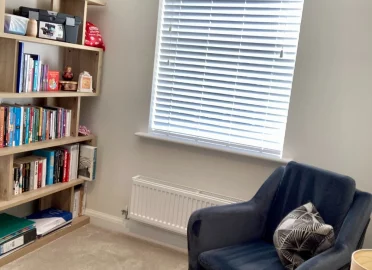Welcome to
Overstone Counselling™
Empowering you to Change, Evolve, Grow
Counselling and Therapy for Personal Growth in a Safe, Supportive Environment
As an Integrative Psychotherapist I tailor my approach to meet your individual needs, blending different therapeutic techniques to create a more personalised and effective therapy experience. With over 6 years of professional practice, I offer a safe and confidential space where you can explore your thoughts and feelings at your own pace and without fear of judgement, to find your path to healing, growth, and a balanced sense of well-being.
My specialisms are working with self-esteem, childhood trauma, anxiety and depression, men’s mental wellness, and executive therapeutic coaching, using an approach based on the philosophy of requiring open-mindedness, patience, empathy, and a willingness to enter your world. This enables us to explore the significant aspects of your life where you feel you want to take control, and create meaningful, lasting change.
I take an active role in our counselling relationship and will work with you to develop coping mechanisms and strategies for the present, while exploring significant events from the past. I share knowledge, information, and tools to promote self-care and self-compassion, helping you build self-confidence, reduce self-criticism, and embrace an improved outlook on life.
Why I Do What I Do
My professional journey has been driven by a deep-seated passion for understanding the human psyche and how we interpret and make sense of our experiences. After 16 years in Financial Services, I retrained as a psychotherapist, completing my undergraduate degree in Integrative Counselling in 2020.
Having learnt how emotional, psychological, and personal challenges influence our way of relating to ourselves and the world, I wanted to better understand how people think, feel, and act, and the mental processes underlying these behaviours, and I completed my post-graduate Psychology degree in 2024.
Academic Background
My academic qualifications enable a deeper understanding of human behaviour, cognitive processes, and emotional regulation, and offer a broad perspective on mental wellness and ill-health. This facilitates complex psychological issues to be explored with greater insight and depth from a more comprehensive viewpoint. Practicing from a Biological, Psychological, and Social (Biopsychosocial) position enables multiple factors to be considered, such as social, cultural, and psychological influences.
My post-graduate research explored the intersectionality of masculinity and talking therapies in a paper entitled: ‘Men Don’t Talk – Myth or Reality? An Interpretative Phenomenological Analysis of the Male Experience of Masculinity and Therapy in Contemporary Society’. Relevant findings from this research have been translated into my practice.
Supervision
I offer individual supervision sessions tailored to both newly qualified therapists and experienced practitioners, focusing on client care, skill-building, self-reflection, and professional growth. I use the Seven-Eyed Model of supervision, a robust framework which allows us to explore your work from multiple angles, ensuring a comprehensive understanding of your therapeutic interventions and relationships within a supportive, reflective learning environment.
I welcome therapists from all backgrounds and modalities, whether you’re in private practice or working within an agency or organisational setting. My supervision is designed to support you wherever you are on your professional journey – please contact me for further information.
Qualifications and Training
Qualifications:
- Master of Science (MSc) – Psychology – University of N7orthampton (2024)
- L6 Therapeutic Counselling Supervisor – CPCAB (2024)
- Arts Foundation Degree (FDA) – Integrative Counselling – University of Leicester (2020)
- Registered member of the BACP Membership No. 381585
- Graduate Member of the BPS Membership No. 672114
Recent Training:
- Impact of Psychological Trauma on the Brain (Oct 2024)
- Working with Sexualised Trauma in the Therapy Room (Feb 2024)
- Working with Dissociation, CPTSD, and Shame (Oct 2023)
- Safe and Effective Trauma Essentials (Jul 2023)
- Working Creatively with the Inner Child (Jan 2023)
Why Choose Me?
Self-Esteem: Helping rebuild and strengthen self-esteem, addressing issues of self-doubt, negative self-talk, and low confidence, guiding you to develop a stronger sense of self-worth, improved relationships, and overall life satisfaction.
Childhood Trauma: Processing and healing from the effects of early life experiences, such as emotional neglect, abuse, or loss, enabling you to understand and overcome past traumas, fostering deep healing and positive change in current relationships and self-perception.
Anxiety & Depression: Solutions for individuals struggling with anxiety, depression, panic attacks, and sleep disturbances, with effective strategies tailored to your needs to manage symptoms, reduce distress, and improve overall mental health, leading to a more balanced and peaceful life.
Men’s Mental Wellness: Providing a safe, non-judgmental space for men to explore and address mental health challenges faced by men, including self-esteem, anxiety, depression, and societal pressures related to masculinity.
Executive Therapeutic Coaching: Empowering executives, professionals, and business leaders to improve self-awareness, leadership skills, and work-life balance through an integrative approach combining therapeutic techniques with coaching strategies.
Client-Centred: My work is always focused on you and your needs. Your goals, your pace, and your well-being are at the heart of everything we do together.
Flexible and Accessible: I offer in-person, Zoom, and telephone appointments at times that fit your schedule, ensuring therapy can be a consistent and supportive part of your life.
Evidence-Based: My interventions are grounded in evidence-based practices and current research so you can receive a high-quality, scientifically supported therapeutic experience.
Professional and Ethical: I’m a registered member of the BACP (British Association for Counselling and Psychotherapy) and a graduate member of the BPS (British Psychological Society), adhering to the highest ethical standards in my practice.
Qualified and Experienced: With an MSc in Psychology, an FDA in Integrative Counselling, and certification as a L6 Therapeutic Supervisor, I bring both academic knowledge and real-world experience to our work.
What Can Counselling Help With
Overstone Counselling™ encourages equality and diversity with all individuals, offering an inclusive culture where all forms of diversity are welcomed, supported, and celebrated, regardless of gender identity, sexual orientation, religion, ethnicity, age, neurodiversity, disability, or any other aspect which makes them unique.
I have experience of working with a wide range of issues including:
Anxiety & Work-related Stress
Relationship Issues
Perfectionism
Depression
Procrastination
Self-Injury
Panic Attacks
Grief, Loss, or Bereavement
Self-Esteem
Childhood Trauma
Self-Confidence
Sessions & Fees
I believe in the value of quality therapy as an investment in our well-being, and I offer a personalised, safe, and contained therapeutic relationship to meet your specific needs. My session fees are £70.00 for 50 minutes (a therapeutic hour), reflecting the depth of my expertise and the personalised care you will receive.
Concessions are available for student and trainee counsellors at a discounted rate of £45.00 for 50 minutes (a therapeutic hour).
All appointments are payable by Bank Transfer 24 hours in advance to confirm your appointment. Cancellations with less than 24 hours’ notice and missed appointments will be charged the full session fee.
Initial Consultation
To help decide if I am the best therapist for you, I offer a free, initial 30-minute Zoom or telephone consultation. This provides an opportunity to introduce ourselves, understand what brings you to counselling and what you hope to achieve.
During this session, I will ask a number of questions to better understand and decide if we will be comfortable working with one another and that the most appropriate type of support can be offered. I will also share my ways of working and answer any questions you may have. You have the right to ask anything you wish to know about my experience or qualifications and to question anything you may not understand.
The aim of this session is to agree our framework and establish our therapeutic relationship. If you feel therapy may be beneficial and choose to continue, we will also discuss how we will work together, how often we meet, session fees, all of which will be included in our working contract. There is no obligation to proceed following the initial consultation.
Location
I offer online therapy and supervision via Zoom UK-wide, as well as in-person appointments at my private practice located in Moulton, Northampton (NN3).
I work with individuals from Northamptonshire, Bedfordshire, Oxfordshire, Leicestershire, and the broader East Midlands region. My practice caters to young adults (ages 18-24), adults (ages 25-64), older adults (ages 65+), and organisations.


Get in touch
Change is possible, and it starts with reaching out. If you’re ready to explore how therapy can help you feel more positive and confident, I’m here to support you. I invite you to contact me for a free, initial 30-minute Zoom or telephone consultation with no obligation, and let’s explore how we can work together to build the life you deserve.
Enquiries will be responded to via email, within 48 business hours.
Frequently Asked Questions
Counselling is usually short-term, solution-focused, and deals with present-day issues
- Typically addresses specific problems, like stress from work, relationship issues, or coping with loss
- Is often a shorter-term process that aims to find practical solutions or relief
- Focuses on what is happening in your life right now, helping you navigate immediate concerns in your life
Example: If you’re feeling overwhelmed with stress because of a big career decision, a counsellor might help you explore your options and outcomes, manage your anxiety, and develop a plan. A counsellor helps you handle current challenges or make decisions, but typically doesn’t explore your past.
Psychotherapy (therapy) is usually long-term, insight-oriented, and explores deeper emotional patterns from the past and present
- Often deals with deeper emotional issues and patterns that may stem from childhood or other long-term experiences
- Is a longer process, going beyond surface-level problems to explore underlying causes
- Offers long-term change and self-discovery, Explores how your past experiences, relationships, or traumas influence your present behaviours and feelings, gaining deeper insight into who you are
Example: If you’ve been struggling with recurring feelings of low self-worth or anxiety that seem connected to childhood experiences, a psychotherapist would help you explore those deeper issues to create lasting change.
Therapists are impartial professionals who listen and express warmth and empathy to assist you to talk openly about your feelings and emotions. They are non-judgmental (not judging what a person discloses about themselves, their attitudes, or behaviours); fair; open and trustworthy to enable a respectful working relationship to develop between you.
Therapy is time set aside by you and your therapist to look at what has brought you to therapy. This might include talking about life events (past and present), feelings, emotions, relationships, ways of thinking and patterns of behaviour. Your therapist will do their best to help you to look at your issues, and to identify the right course of action for you, either to help you resolve your difficulties or help you find ways of coping.
Therapy is a very personal process and sometimes it is necessary to talk about painful feelings or difficult decisions, so you may go through a period of feeling worse than when you started. Research shows that this is common and natural. It is important to discuss this with the therapist if you are concerned.
At Overstone Counselling™, we work on an open-ended basis as I believe there is no 'one-size-fits-all' when it comes to therapy; it varies from person to person and will often depend on the depth of the issues you are facing and what your individual needs are.
Some people find that after several sessions they have clarity and focus and are ready to end therapy. Other people value the ongoing support and relationship with me and will continue for weeks, months, or years. You decide how long your therapy will last, and we will review the process together at regular intervals to ensure therapy continues for only as long as it is of benefit to you.
Here are some practical examples to get the best results from your therapy:
- Be Open and Honest: Share your thoughts and feelings, even if something feels embarrassing or difficult to talk about, being honest with your therapist helps them understand what’s really going on. The more you share, the more your therapist can help.
- Be Patient with the Process: Progress doesn’t happen overnight. Sometimes, it may feel slow or difficult, and that’s not unusual. It’s important to be patient with yourself and the therapeutic journey. You might feel like giving up if things get emotional or uncomfortable, however this is often when growth happens.
- Be Open to Feedback: Sometimes your therapist may point out things you didn’t realise about yourself. This can feel surprising or even challenging, but being open to their feedback can lead to powerful insights and progress.
- Communicate with Your Therapist: If you’re feeling or noticing positive changes, let your therapist know! If your therapist suggests something that you don’t understand or that doesn’t sit well with you, speak up - it helps them understand what’s working and not working, and can help you feel more in control and engaged.
- Trust the Relationship: A strong therapeutic relationship (connection with your therapist) is one of the most important factors in successful therapy. Trust and rapport take time to develop, so give yourself space to build that connection. Therapy works best when you feel safe, supported, and understood.
Protecting the confidentiality and privacy of my clients is an essential part of my service, however no therapist can offer 100% confidentiality as there are exceptions and situations where the law requires disclosure of risk.
If there is a risk of serious harm to yourself or others, confidentiality may need to be broken. Where possible, I will aim to discuss any issues of confidentiality with you and obtain your consent to pass information (if needed) to a third-party (e.g. your GP). Confidentiality will also be broken where I have a statutory obligation to do so, for example, reporting disclosures of information, involving terrorism, money laundering or drug trafficking under the Terrorism Act 2000.
However, breaking confidentiality is rare, and happens (but not always) after talking with the person concerned, and with their knowledge and consent. Therapists do not make telephone calls or engage in discussions about you to your GP, employer, partner, family members, friends or to other agencies to find out, clarify, or add to your personal information without your knowledge.
When you attend therapy, it's important you feel free to talk about whatever is significant to you. Having a friend or family member with you is not usually helpful because they may have their own agenda for you. Even if this is them being supportive, or wanting you to 'get better', this may prevent us talking about the things that matter to you. You may need to explore thoughts or behaviours about which you feel ashamed or embarrassed, and you may censor yourself so as not to hurt someone or find that what they want you to talk about is not really what you want to discuss.
On some occasions, family and friends may even be part of an underlying issue which needs to be aired and discussed. If in asking this question you are feeling nervous or anxious about coming to an appointment alone, this anxiety is quite normal, and you will not be forced to talk about anything you feel uncomfortable about - but you do need to be able to talk openly about whatever is important. For this reason, I do not see clients accompanied by friends or family.
Where a friend or relative may be providing transport to and from your appointment, as I work from home and do not have a waiting room, they are welcome to remain in their vehicle while you are at your appointment.


